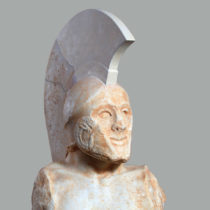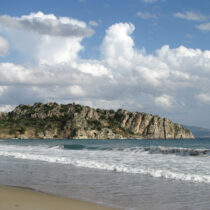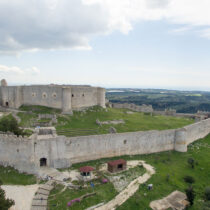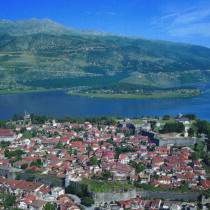PhD position in Ancient History
The Emmy-Noether junior research group "power and influence: influencing emperors between antiquity and the middle ages“ offers one PhD position.
Post-doctoral Research Fellowship in UCL Greek and Latin
Applications are invited for a post-doctoral Fellowship, funded by the A.G. Leventis Foundation, in the Department of Greek and Latin at UCL.
Warwick Taught Masters Scholarship Scheme (WTMSS) for 2016-17 entry
University of Warwick has launched 100 awards of £5000 per student for Taught Masters students commencing their studies in 2016-17. Three of them are in Ancient Visual and Material Culture.
Archaeologists in Denmark seek police help to investigate fire
Archaeologists in Denmark have asked the police to help them clarify whether a fire that destroyed a castle 1,000 years ago was set on purpose.
6,000 year old telescope without a lens
Astronomers are exploring what might be described as the first astronomical observing tool, potentially used by prehistoric humans 6,000 years ago.
Infant bodies were ‘prized’ by 19th century anatomists, study suggests
Bodies of foetuses and babies were a "prized source of knowledge" by British scientists of the 18th and 19th centuries.
Prehistoric birds wings exceptionally preserved in amber
Two wings from birds of the pre-Cretaceous Period, exceptionally preserved in amber, have been found in north-east Myanmar.
Pleistocene-era mammoth remains uncovered in Mexico
The remains of a mammoth from the Pleistocene era found in Mexico in December are now being dug up by archaeologists and experts.
Temple of Nabu partly destroyed by IS
Unesco and prominent archaeologist condemn the destruction of the Temple of Nabu in northern Iraq by the Islamic State.
Classical Association Annual Conference 2017
The Annual Conference of the Classical Association, in association with the University of Kent and the Open University, will take place on 26-29 April 2017, in Canterbury (UK).
Holocaust Escape Tunnel Rediscovered in Lithuania
For the first time since the Holocaust the famous tunnel used by the prisoners of Ponar (Paneriai) to escape from the Nazis had been located.
Fire discovery sheds new light on ‘hobbit’ demise
Crucial new evidence has revealed modern humans (Homo sapiens) were likely using fire at Liang Bua 41,000 years ago...
A Gateway to Pan Exposed at Hippos
Has the gate to the compound of the god Pan been discovered at Hippos (Sussita)? A monumental Roman gate discovered in the excavations may answer the question.
Researchers find human development’s first gear
Oxford University researchers are closer to solving a decade-old mystery after discovering that a set of genes they are studying play a key role in early human development.
Seven shipwrecks located off Delos’ shores
Seven shipwrecks, six of the Late Hellenistic and one of the Roman period, were located between Delos and the Rhenea island.
Viking tomb found in Denmark contains noble couple
A tomb containing the remains of two men and a woman found in Denmark offers valuable information on international Viking culture.
Sacrificed animals in Canaan came from Egypt
Archaeologists at Gath have uncovered remains of sacrificed animals coming from Egypt, establishing animal trade connections between the Old Kingdom and ancient Canaanites about 5,000 years ago.
An Indo-Greek city’s ruins have been found in Pakistan
The city is characterized by a large defensive wall, while weapons and coins as well as important pottery point to the Indo-Greek identity of the settlers.
What did Earth’s ancient magnetic field look like?
New research suggests Earth’s ancient magnetic field was significantly different than the present day field, originating from several poles rather than the familiar two
Byzantium through the Centuries
On 24 June 2016 the exhibition Byzantium through the Centuries opened in the State Hermitage as one of the main events of this cross-cultural year.
Skeletons and gold coins found near Pompeii
Archaeologists discovered four skeletons and gold coins on the outskirts of Pompeii, at an excavation of an ancient shop.
The cemetery at the site of Triantafyllia in Livanates (6th-2nd c. BC)
This paper focuses mainly on the burial practices of the cemetery at the site of Triantafyllia Livanates in Opuntian Locris by presenting the particular practice of burying the dead exclusively in jars.
Ancient ‘Deep Skull’ from Borneo full of surprises
A new study of the 37,000-year old remains of the "Deep Skull" has revealed this ancient person was not related to Indigenous Australians, as had been originally thought.
Amber fossils reveal ancient insect camouflage behavior
Insects have evolved diverse types of camouflage that have played an important role in their evolutionary success.




























